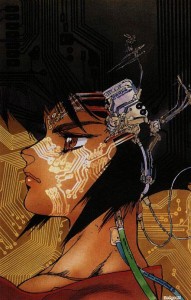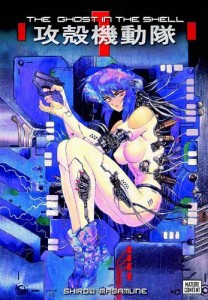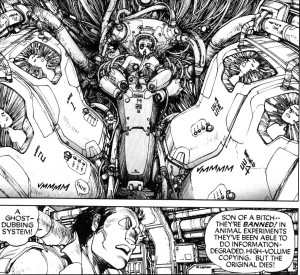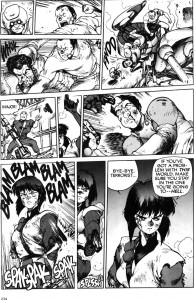SF Manga 101: Ghost in the Shell
Glenn Hough (gallyangel) is a nonpracticing futurist, an anime and manga otaku, and is almost obsessive about finishing several of the lists tracked on WWEnd. In this series on SF Manga Glenn will provide an overview of the medium and the place of science fiction in it.
Hi. Hi. Glad to see you again. Welcome. It’s practically time to say pull up a chair by the fire. It’s the dampness. That’s what gets me.
Since I know we can all go wiki-wiki and have all the summery one could want in seconds, I’d like to concentrate on the questions: why these mangas? Out of all of the possible SF mangas, why should we, why did I, pay attention to these?
Well, when it comes to the top SF mangas out there, I think the top three spots are basically agreed upon. Their order, however, is not. It’s a matter of personal appeal. Do you go for the ecological collapse and resource wars as humanity lives on in the twilight world of Nausicaa? Or do you go for the forced human evolution and the releasing of psychic powers which can not be controlled in Akira? Or do you go with the cyberpunk ethic, wrapped in a police procedural, which ends in something that looks very much like what the Kurzweil crowd would call the singularity in Ghost in the Shell?
Personally, I think Ghost in the Shell takes the top spot. Yes, definitely, all three have transformation at their cores but I think Ghost is more relevant as a motif for what the 21st century will be about.
Let’s take a look now at what the publisher says about Ghost in the Shell:
Deep into the 21st century, the line between man and machine has been inexorably blurred as humans rely on the enhancement of mechanical implants and robots are upgraded with human tissue. In this rapidly converging landscape, cyborg super-agent Major Motoko Kusanagi is charged to track down the craftiest and most dangerous terrorists and cybercriminals, including “ghost hackers,” capable of exploiting the human/machine interface by re-programming human minds to become puppets to carry out their criminal ends. When Major Kusanagi tracks the cybertrail of one such master hacker, the Puppeteer, her quest leads her into a world beyond information and technology where the very nature of consciousness and the human soul are turned upside-down and inside-out.
Yes it’s violent. Yes, it contains graphic lesbian hentai (in the uncensored version). It has devious politicos, gang-bangers, terrorists, hackers, assignations, corporate rule, ghost dubbing and children enslaved by corporations. The major has 00 “license to kill” status and exercises it. There’s political and economic manipulation by governments, via A.I. And there’s even a bona fide full blown M.I. running loose. But it’s the ending which I think clinches it’s top of the heap status for me. It’s the stuff that the Kurzweil posse talks about. Which, ultimately, is very hopeful since it’s a message of evolution/transformation.
If my description of this manga sounds a bit familiar, it should. It’s like we’re living in the precursor stages of the world Ghost in the Shell is set in. And you have to remember that Ghost was first published over 20 years ago(!) by Young Magazine between May 1989 and November 1990. George Bush Sr. was in office and the internet, as we understand it today, did not exist. There was still a Soviet Union. The world was still split between East (Soviet Russia) and West (US/Europe). The East/West split today could well be called China/US and Europe. One might well consider Shirow to be something of a minor prophet. Or he could just be better at getting a handle on where technology seems to be going and has better extrapolation skills than most. Either way, you can not, should not, underestimate his influence in the last twenty years when it comes to Hollywood movies and techno hard SF. I’d personally argue that he ranks with William Gibson in marking a epochal boundary in the annals of SF. Perhaps one could say that everything Gibson was striving for in Neuromancer, now, suddenly, has graphic representation, which distills and amplifies all of it.
Kurzweil’s leap into popular discourse on the future was the book The Age of Spiritual Machines, which was published nine years after the initial Japanese run of Ghost and over five years after the initial Dark Horse publication of Ghost in English. I find it interesting that both he and Shirow were thinking in the same direction. And almost simultaneously this quote appears: “When two separate events occur simultaneously pertaining to the same object in inquiry we must always pay strict attention.”
Agent Cooper, of Twin Peaks fame, was talking about murder. But the principal is sound. Both Shirow and Kurzweil talk about the evolution of humanity, via the machine, into something else. It’s like, at that particular moment in time there was something in the air, something in the collective unconsciousness, or, if you really want to go for it, the effect of future events were being felt at that particular moment, by these artists or thinkers, like waves upon a still pond; waves rippling backward in time to effect the past. (There is physics data to support that notion.)
In the manga Shirow challenges us with the question: where does humanity stop (the individual) and where does our technology (the machine) start. And is this even a valid question any longer? Does it matter?
 I think, ultimately, that it does not. That the differences between M.I. (Machine Intelligence), D.I. (Digital Intelligence), and O.I. (Organic Intelligence) are about as important as the differences between Granny Smith apples, Red Delicious apples, and Honeycrisp apples. Different, yes. Each has a better use than the others in the kitchen. But they’re all apples. And that’s what it always comes down to, they’re all apples. They’re all intellegences. Each kind striving for…
I think, ultimately, that it does not. That the differences between M.I. (Machine Intelligence), D.I. (Digital Intelligence), and O.I. (Organic Intelligence) are about as important as the differences between Granny Smith apples, Red Delicious apples, and Honeycrisp apples. Different, yes. Each has a better use than the others in the kitchen. But they’re all apples. And that’s what it always comes down to, they’re all apples. They’re all intellegences. Each kind striving for…
“Ah… the net is vast…” says Motoko.
Vast indeed. Vast enough to hold infinite possibilities.
P.S.: I almost forgot to mention Ghost‘s publishing status since some of the manga I’ll be blogging about aren’t readily available. Ghost in the Shell by Masamune Shirow (that’s a pen name) is widely available. I think Ghost is one of those which will rarely, if ever, go out of print. The two different print runs from Dark Horse comics are easily available. Kodansha comics is who now holds the English rights and their current edition is only a few mouse clicks away at your favorite online bookseller.



















 Full Details
Full Details





1 Comment
Great review! Haven’t read enough Manga to be able to weigh in on your choice as the top spot, and I haven’t read this one, though now I’m really excited to. I have seen the movie though and it was the one that got me into anime. Good stuff.
Sorry, the comment form is closed at this time.